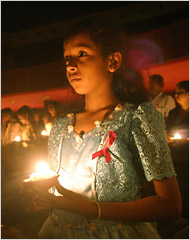| Want to send this page or a link to a friend? Click on mail at the top of this window. |
| Posted May 30, 2006 |
| TELEVISION REVIEW |
| The Epidemic as Avalanche: A Two-Part Series Documents 25 Years of Aids |
| ___________________ | |
By ANITA GATES |
|
| ___________________ | |
THERE'S Elizabeth Taylor, pretty in pink, and beside her Nancy Reagan, elegant in white, wearing a cautious version of her adoring-wife gaze. Ms. Taylor looks pleased, too. It is 1987, and at her invitation, six years into the AIDS epidemic, President Ronald Reagan is making his first — and, as it turned out, only — speech on the subject.
 |
Anuruddha Lokuhapuarachchi/Reuters |
| A Si Lankan girl takes part in a memorial for those who died of AIDS. |
The scene is from "The Age of AIDS," a gripping (eventually) two-part, four-hour "Frontline" documentary that begins tonight on PBS. It doesn't offer a lot of movie star scenes like that, but it's loaded with drama. The most bizarre juxtaposition has to be Bono, of the rock group U2, quoting Scripture to Senator Jesse Helms.
This year is the 25th anniversary of the epidemic, dating from the reports of the initial cases in the United States in 1981, first among gay men, then among intravenous drug users and then among Haitian immigrants. The program, perhaps trying a little too hard to maintain its dignity, manages to make the story of the earliest developments almost boring.
Only Cleve Jones, founder of the Names Project (the AIDS memorial quilt), captures the overwhelming, almost surreal quality of those days.
"It seems like it was just an avalanche," Mr. Jones recalls. "It was like one week we'd never heard of it, and then the next week everybody started to die. People began to vanish."
Eventually, though, the story picks up steam, particularly in Part 2, to be shown tomorrow night. By the end, with all the outrages and grievous mistakes of the last quarter-century piled up, this has become a tremendously important television document with real impact.
There are a few heroes, including Rock Hudson, who died of AIDS in 1985, and workers at the Centers for Disease Control, who have already been immortalized in Randy Shilts's AIDS history, "And the Band Played On." But there is a surfeit of villains.
The biggest is Thabo Mbeki, the president of South Africa, who insisted that H.I.V. did not cause AIDS. "How does a virus cause a syndrome?" he asks rhetorically in a speech. "It can't."
By 1999 one of five South African adults had the virus. One was a son of Mr. Mbeki's predecessor, Nelson Mandela; Mr. Mandela is seen briefly at his son's funeral in 2005.
The program does recount some success stories. In Uganda an educational campaign focusing on prevention (condoms, abstinence or sexual fidelity) led to a major decline in the rate of infection. There were similar results in Thailand, where the government forced radio stations to broadcast AIDS education messages.
In a way "The Age of AIDS" is the story of the drugs to treat it. AZT, a cancer medication from the 1950's, turned out to be a breakthrough, but thanks to its manufacturer, Burroughs Wellcome, a year's supply initially cost about $10,000. Activists demonstrated and fought, and eventually prices were brought down, although not nearly enough to help the millions infected in Africa. Then in 1996 a cocktail of drugs, including protease inhibitors, was shown to suppress the virus, if taken regularly.
For Americans with health insurance it has been a miracle. It is almost June, and so far this year The New York Times has published only one obituary in which the cause of death was given as AIDS. In 1991 there were 81, including those of Tony Richardson, Freddie Mercury and Larry Kert.
But elsewhere on the planet, the pandemic is still growing. Some 30 million people have died of AIDS. Roughly 40 million new infections are predicted over the next decade. Near the end of "The Age of AIDS," former President Bill Clinton predicts a vaccine in his lifetime. Others are far less optimistic.
Frontline The Age of AIDS On most PBS stations tonight and tomorrow night. (Check local listings.) Produced and directed by William Cran (Part 1) and Greg Barker (Part 2); written by Mr. Cran and Renata Simone (Part 1), and by Mr. Barker and Ms. Simone (Part 2); series producer and reporter, Ms. Simone. Co-produced by WGBH/Frontline and Paladin InVision Ltd. with Silverbridge Productions Ltd. and Channel 4; "Frontline" produced by WGBH Boston; Michael Sullivan, "Frontline" executive producer for special projects; David Fanning, executive producer for "Frontline."
Copyright 2006 The New York Times Company. Reprinted from The New York Times, TheArts, of Tuesday, May 30, 2006..
| Wehaitians.com, the scholarly journal of democracy and human rights |
| More from wehaitians.com |